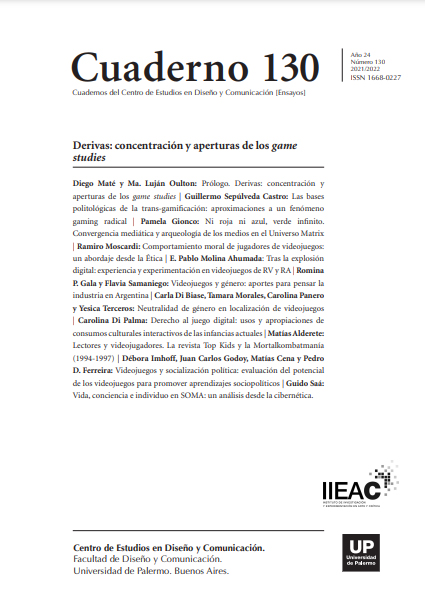Videojuegos y socialización política: evaluación del potencial de los videojuegos para promover aprendizajes sociopolíticos
Abstract
We propose to conceive video games as scenarios where socio-political socialization takes place. Thus, the study explored the political potential of video games, analysing the socio-political learning experiences identified by their users, and determining their link with habits, experiences and attitudes towards video games, and with psychopolitical variables (internal political efficacy, individual and collective political participation). A quantitative empirical study was carried out with 750 university students and professors from Argentina, selected by accidental non-probabilistic sampling.
References
American Psychological Association. (2017). Ethical Principles of Psychologists and Code of Conduct. Recuperado de https://www.apa.org/images/ethics-code-2017_tcm7-218783.pdf
Bogost, I. (2006). Playing Politics: Videogames for Politics, Activism, and Advocacy. First Monday, 7.
Bogost, I. (2007). Persuasive games: Videogames and procedural rhetoric. Cambridge: MIT Press.
Cabañes, E. & Jaimen, N. (2021). Videojuegos para la participación ciudadana. Cuadernos del Centro de Estudios en Diseño y Comunicación [Ensayos] 23(98), 151-161.
Curry, K. (2010). Warcraft and Civic Education: MMORPGs as Participatory Cultures and How Teachers Can Use Them to Improve Civic Education. The Social Studies, 101(6), 250-253.
Dahya, N. (2009). Serious Learning in Playful Roles: Socio-political games for education and social change. Loading…, 3(4).
Dalisay, F.; Kushin, M. J.; Yamamoto, M.; Liu, Y. I. & Skalski, P. (2014). Motivations for game play and the social capital and civic potential of video games. New Media & Society, 17(9), 1399-1417.
Domínguez, A. K. (2021). Diseño de videojuego como terapia de juego para niños con Asperger. Cuadernos del Centro de Estudios en Diseño y Comunicación [Ensayos] 23(98), 129-140.
Entertainment Software Association (2019). 2019 Essential Facts About the Video Game Industry by the ESA. Recuperado de https://www.theesa.com/wp-content/uploads/2019/05/2019-Essential-Facts-About-the-Computer-and-Video-Game-Industry.pdf
Eränpalo, T. (2014). Exploring Young People’s Civic Identities through Gamification: A Case Study of Finnish, Swedish and Norwegian Adolescents Playing a Social Simulation Game. Citizenship, Social and Economics Education, 13(2), 104-120.
Ferguson, C. J, & Garza, A. (2011). Call of (civic) duty: Action games and civic behavior in a large sample of youth. Computers in Human Behavior, 27(2), 770-775.
Ferreira, P. & Menezes, I. (2005). The relevance of the quality of life-experiences for citizenship development: na inter-domain developmental study. En Menezes, I.; Coimbra, J. y Campos, B. (Eds.) The affective dimension of education: European perspectives (pp.185- 201). Portugal: FCT, Universidade do Porto.
Ferreira, P.; Azevedo, C. & Menezes, I. (2012). The developmental quality of participation experiences: Beyond the rhetoric that “participation is always good!” Journal of Adolescence, 35, 599-610. doi:10.1016/j.adolescence.2011.09.004
Gala. R. (2021). Un acercamiento posible a la creación de videojuegos políticos en Buenos Aires. Cuadernos del Centro de Estudios en Diseño y Comunicación [Ensayos] 24(110), 35-52.
Godoy, J. C. (05 de agosto de 2016). Jugar puede ayudar a hacer un mundo mejor. La Voz del Interior.Gonzalez, C.; Saner, L. & Eisenberg, L. (2013). Learning to stand in the other’s shoes: A computer video game experience of the Israeli-Palestinian Conflict. Social Science Computer Review, 31(2), 236-243.
Gordon, E. & Koo, G. (2008). Placeworlds: Using Virtual Worlds to Foster Civic Engagement. Space and Culture, 11(3), 204-221.
Hassan, L. (2017). Governments Should Play Games: Towards a Framework for the Gamification of Civic Engagement Platforms. Simulation & Gaming, 48(2).
Hassan, L. & Hamari, J. (2020). Gameful civic engagement: A review of the literature on gamification of e-participation. Government Information Quarterly.
Haste, H. (2004). Constructing the Citizen. Political Psychology, 25 (3), 413-439.
Imhoff, D. & Brussino, S. (2017). Socialización política: la dialéctica relación entre individuo y sociedad. En Brussino, S. (Comp.) Políticamente, contribuciones desde la psicología política en Argentina (pp.37-70). Bs. As.: CONICET.
Imhoff, D. & Brussino, S. (2019) Effect of political socialization on children: quasi-experimental study with Argentinian children. Infancia y Aprendizaje, 42 (1), 179-243. DOI: 10.1080/02103702.2018.1555203.
LeCompte, K.; Moore, B. & Blevins, B. (2011). The Impact of iCivics on Students’ Core Civic Knowledge. Research in the Schools, 18(2), 58-74.
Lee, N. J.; Shah, D. V. & McLeod, J. M. (2013). Processes of political socialization: a communication mediation approach to youth civic engagement. Communication Research, 40(5), 669-697.
Lenhart, A.; Kahne, J.; Middaugh, E.; Macgill, A. R.; Evans, C. & Vitak, J. (2008). Teens, video games, and civics: teens’ gaming experiences are diverse and include significant social interaction and civic engagement. Pew internet & American life project. Recuperado de http://www.pewinternet.org/2008/09/16/teens-video-games-and-civics/
Maté, D. (2021). Game studies: apuntes para un estado de la cuestión. Cuadernos del Centro de Estudios en Diseño y Comunicación [Ensayos] 23(98), 19-35.
Molyneux, L.; Vasudevan, K. & Gil de Zúñiga, H. (2015). Gaming Social Capital: Exploring Civic Value in Multiplayer Video Games. Journal of Computer-Mediated Communication, 20(4), 381-399.
Oulton, L. (2021). Prólogo. Cuadernos del Centro de Estudios en Diseño y Comunicación [Ensayos] 23(98), 11-18.
Robinson, N. (2012). Videogames, Persuasion and the War on Terror: Escaping or Embedding the Military - Entertainment Complex? Political Studies, 60(3).
Roussos, G. & Dovidio, J. F. (2016). Playing below the poverty line: Investigating an online game as a way to reduce prejudice toward the poor. Cyberpsychology: Journal of Psychosocial Research on Cyberspace, 10(2).
Sandoval Forero, C. G. & Sánchez, A. T. (2017). El videojuego como herramienta prosocial: implicaciones y aplicaciones para la reconstrucción en Colombia. Análisis Político, 30(89), 38-58.
Sepúlveda Castro, G. (2021). Transgamificación y cultura: del videojuego como producto cultural al videojuego como totalidad cultural. Cuadernos del Centro de Estudios en Diseño y Comunicación [Ensayos] 23(98), 175-187.
Sicart, M. (2009). Mundos y Sistemas: entendiendo el Diseño de la Gameplay Ética. Comunicación, 7(1), 45-61. Recuperado de: https://idus.us.es/handle/11441/58049
Sitzmann, T. (2011). A meta-analytic examination of the instructional effectiveness of computer-based simulation games. Personnel Psychology, 64(2), 489-528.
Los autores/as que publiquen en esta revista ceden los derechos de autor y de publicación a "Cuadernos del Centro de Estudios de Diseño y Comunicación", Aceptando el registro de su trabajo bajo una licencia de atribución de Creative Commons, que permite a terceros utilizar lo publicado siempre que de el crédito pertinente a los autores y a esta revista.


